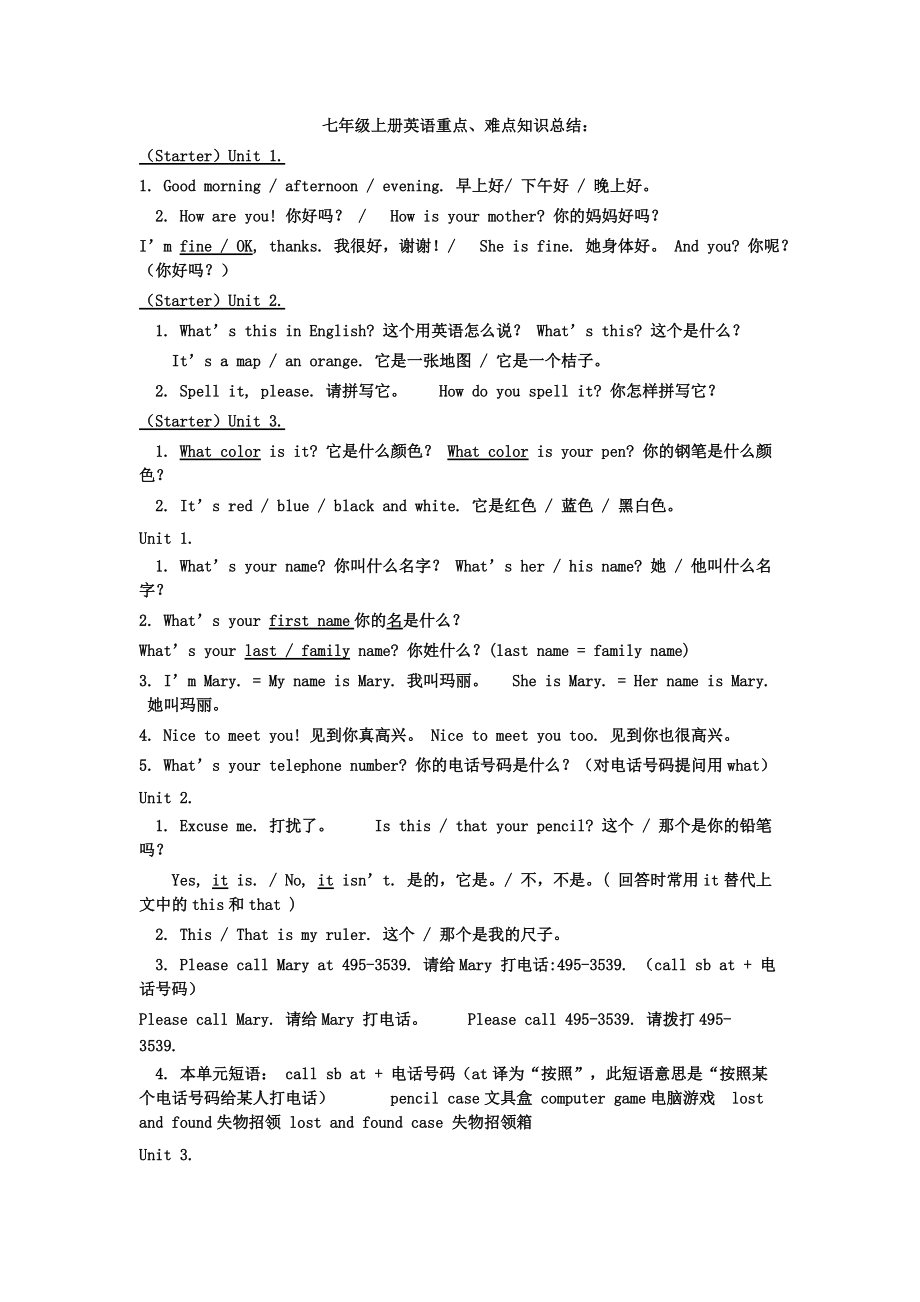 七年级上册英语重点、难点知识总结
七年级上册英语重点、难点知识总结



《七年级上册英语重点、难点知识总结》由会员分享,可在线阅读,更多相关《七年级上册英语重点、难点知识总结(7页珍藏版)》请在装配图网上搜索。
1、七年级上册英语重点、难点知识总结:(Starter)Unit 1.1. Good morning / afternoon / evening.早上好/下午好/晚上好。2. How are you!你好吗?/How is your mother?你的妈妈好吗?Imfine / OK, thanks.我很好,谢谢!/She is fine.她身体好。And you?你呢?(你好吗?)(Starter)Unit 2.1. Whats this in English?这个用英语怎么说?Whats this?这个是什么?Its a map / an orange.它是一张地图/它是一个桔子。2. Spe
2、ll it, please.请拼写它。How do you spell it?你怎样拼写它?(Starter)Unit 3.1.What coloris it?它是什么颜色?What coloris your pen?你的钢笔是什么颜色?2. Its red / blue / black and white.它是红色/蓝色/黑白色。Unit 1.1. Whats your name?你叫什么名字?Whats her / his name?她/他叫什么名字?2. Whats yourfirst name你的名是什么?Whats yourlast / familyname?你姓什么?(last n
3、ame = family name)3. Im Mary. = My name is Mary.我叫玛丽。She is Mary. = Her name is Mary.她叫玛丽。4. Nice to meet you!见到你真高兴。Nice to meet you too.见到你也很高兴。5. Whats your telephone number?你的电话号码是什么?(对电话号码提问用what)Unit 2.1. Excuse me.打扰了。Is this / that your pencil?这个/那个是你的铅笔吗?Yes,itis. / No,itisnt.是的,它是。/不,不是。(回
4、答时常用it替代上文中的this和that )2. This / That is my ruler.这个/那个是我的尺子。3. Please call Mary at 495-3539.请给Mary打电话:495-3539.(call sb at +电话号码)Please call Mary.请给Mary打电话。Please call 495-3539.请拨打495-3539.4.本单元短语:call sb at +电话号码(at译为“按照”,此短语意思是“按照某个电话号码给某人打电话)pencil case文具盒computer game电脑游戏lost and found失物招领lost
5、and found case失物招领箱Unit 3.1.This/Thatismy sister.这位/那位是我的姐姐。此句的复数形式是:These/Thosearemysisters.这些/那些是我的姐姐们。(this/ that的复数分别是these / those)2.Itisawatch.复数形式是:Theyaresomewatches.(he / she / it复数都是they,和this/that的复数不同)3. Is he / Guo Peng your brother?他/郭鹏是你的哥哥吗?Yes, he is. / No, he isnt.是的,他是。/不,他不是。4. T
6、hanks for the photo of your family.感谢你寄来你的家庭照(全家福)。句中thanks = thank you,另外the photo of your family = your family photo5.Here ismy familyphoto.这儿是我的家庭照。Here aresomebooks.这儿有一些书。There isapictureand three pencils on the desk.桌子上有一幅画和三支铅笔。There aremanyphotosin the drawer.抽屉里有许多照片。(here / there后的be动词单复数形
7、式要以紧随其后的名词单复数来定)Unit 4.1. Whereismybackpack?我的背包在哪儿?Wherearethebooks?那些书在哪儿?2.Its / Theyrein the drawer / under the bed / on the bookcase.它/它们在抽屉里/床底下/书柜上。(注意主语和be动词照应)3.Is it / Is the book / Are theyon the bed / in the backpack / under the desk?它/这本书/它们在床上/背包里/桌子下吗?4. Can you bringsomethings to sch
8、ool?你能带些东西去学校吗?some一般用在肯定的陈述句中,any用在否定句(“任何”)或疑问句(“某些,一些”)中。但如果表示期待对方肯定的回答或表请求和建议,疑问句中常用some。如上句。5. take to 把带到Please take your sister to school.请把你的妹妹带到学校。bring表从另一处带到这儿。take表从这儿带到另一处。方向正好相反。Unit 5.1.Doyouhavea soccer ball?你有一个足球吗?Yes, I do. / No, I dont.Doesshehavea tennis racket?她有一个网球拍吗?Yes, she
9、 does. / No, she doesnt.(谓语是实义动词的时候,疑问句形式:do / does提前到主语前,主语后面的动词用原形)2. Idont havea soccer ball.我没有一个足球。Shedoesnt havea volleyball.她没有排球。(谓语是实义动词的时候,否定形式:do /does +not +动词原形)3. Let me / him / usplaysoccer.让我/他/我们踢足球吧。(let后面的动词用原形)4.Thatsounds good / great / interesting / boring.那听起来不错/好极了/有趣/无聊。(tha
10、t指代上文之事)5. I / We / They / You / The kidshave8 baseballs.我/我们/他们/孩子们有8个棒球。She / He / My brother / The boyhas8 baseballs.她/他/我哥哥/那个男孩有8个棒球。(注意以上各句主语和谓语的照应:主语是单三,谓语也用单三;主语不是单三,谓语也不用单三。)6.本单元短语:tennis racket网球拍ping-pong bat乒乓球拍ping-pong / soccer / tennisball乒乓球/足球/网球(指物品)play tennis /basketball /baseba
11、ll /ping-pong /volleyball /soccer /football “打,踢”(指运动)play computer games打电脑游戏on TV在电视上(通过电视)every day每天Unit 6.1. Do you like bananas / hamburgers / salad?你喜欢香蕉/汉堡包/沙拉吗?Yes, I do. / No, I dont.是的,我喜欢。/不,我不喜欢。2. like doing sth. = like to do sth.喜欢做某事.如:She likeshelping/to helpstudents.她喜欢帮学生。3.短语:for
12、 breakfast / lunch / dinner / dessert对早餐/午餐/晚餐/甜食来说running star跑步明星lots of = a lot of (后既可接可数名词复数,又可接不可数名词)healthy food健康食品Unit 7.1. How mucharethesepants? =Whatsthepriceof these pants?这条裤子多少钱?Theyretwenty dollars.这条裤子20美元。How muchisthis sweater? =Whatsthepriceof this sweater?这件毛衣多少钱?Its60 yuan.它60元
13、。2. How much加不可数名词,how many加可数名词复数。如:howmuchfood, howmanystudents3. Can I help you?我能帮你吗?What can I do for you?我能为你做什么?4. Yes, please.是的,请吧。No, thanks.不了,谢谢。5. I want a sweater.我想要件毛衣。6. What color do you want?你想要什么颜色?7. Here you are. =Here it is给你(这件毛衣/钱等)。8. How much is it? / How much are they?多少钱
14、?9. Ill take it. = Ill get it. = Ill have it.我买下它了。10. Thank you. / Thanks a lot.多谢。Youre welcome. =Thats all right.别客气。11. Come and buy = Come to buy .Go and see = Go to see12. Anybody can afford our prices.任何人都能承担得起我们的价钱。13.短语:at a good price以合理的价格have a look (at)“看一看()”=look (at )for girs / boys
15、/ sports.对姑娘/男孩/运动来说sell to把卖给buy from从买on sale在出售Unit 8.1. When is your / her / his birthday?你的/她的/他的生日是什么时候?My / Her / His birthday is May 14th.我的/她的/他的生日是5月14日。(此处无on)2. How old are you? = Whats your age?你多大了?Im 8. / Im 8 years old.我8岁了。3. Monday is the second day of the week.周一是一星期中的第二天。(序数词前常有t
16、he)Itsmyeighth birthday. (序数词eighth前已有限定词my,故不再加the.)4.短语:birthday party生日聚会English speech contest英语演讲比赛music festival音乐节school day校庆日school trip学校组织的旅行volleyball game排球比赛Unit 9.1. Do you / Does she want to go to a movie?你想/她想看电影吗?2.What kind ofmovies do you like?你喜欢什么种类的电影?3. Junereallylikes action
17、 movies.琼真的喜欢动作片。(really可修饰动词,但very不能。)4. Mike is English.迈克是英国人。(注意English前无冠词an.)5. I often go to movies with my friends.我常和朋友一起看电影。(with,“用;和一起”)6.短语:learn about学习有关的知识Chinese history中国历史on weekends.在周末action movies动作片go to a movie去看电影want to do sth.想要做某事7.语法:并列连词and和or.都译为“和”,or常用于否定句。and常用于肯定句。
18、He likes P.E.andart.他喜欢体育和美术。=He likes P.E.andhe likes art.He doesnt like P.E.orart. =He doesnt like P.E.andhe doesnt like art.(or只用于连接否定句中的短语。若连接两个否定句时仍用and,如后一句。)Unit 10.1. Can you play the guitar? Can you dance / swim?你会弹吉它/跳舞/游泳吗?Yes, I can. / No, I cant.是的,我会。/不,我不会。2. I want to join the art /
19、music club.我想参加美术/音乐俱乐部。3. What club do you want to join?你想参加什么俱乐部?4. Can you play the piano well?你弹钢琴弹得好吗?5. Are you good with kids?你善于和孩子相处吗?(be good with sb.善于和某人相处)6. May I know your name?我可以知道你的名字吗?= Whats your name?7. What can you do?你会做什么?8.短语:play the piano / the drums / the trumpet弹钢琴/打鼓/吹喇
20、叭(乐器前有the)chess / English / swimming / music club象棋/英语/游泳/音乐俱乐部a little“一点,一些”(修饰不可数名词。)Unit 11.1. What timedo you/does sheusually go to school/ get up?你通常何时上学/起床?I usually run/ She usually gets up at around 7:00.我/她通常大约7:00跑步/起床。2. When do people usually eat dinner?人们通常什么时候吃晚饭?3.短语:inthe morning /
21、afternoon / evening在早上/下午/晚上(用介词in)(若有其它修饰词,常用介词on: onSundaymorning; on the eveningof May 1st.)go home回家get home到家go to bed上床睡觉take a shower洗澡get up起床best wishes致以良好的祝愿listen to music / me听音乐/听我(说)all day and all night整天整夜brush teeth刷牙take the No. 305 bus to school乘305路车去学校write a letter to sb=write
22、 to sb =write sb.给某人写信4.时刻表达:1分钟未过半点;7:20,可以读作:seven twenty,或twentypastseven12:08,可以读作:twelve oh eight,或eightpasttwelve2分钟刚好半点:9:30,可读作:nine thirty,或halfpastnine3分钟超过半点:8:46,可读作:eight forty-six,或fourteentonine5. what引导的感叹句的结构:1what + a / an +形容词+名词+主谓What a clever boy he is!他是多么聪明的孩子啊!What an intere
23、sting book you have!你的书多么有趣啊!2what +形容词+名词复数:What clever boys you are!你们是多么聪明的孩子啊!3what +形容词+不可数名词:What difficult work it is!那是多么困难的工作啊!6.宾语从句的语序(用陈述句的语序,见下文画线部分):I dont knowwhen your birthday is.(不是when is your birthday)Can you tell mewhere you come from?(不是where do you come from)Unit 12.1. Whats y
24、our favorite subject?你最喜爱的学科是什么?(形容词性物主代词+favorite+名词,“最喜爱的.”)2. My favorite subject is science.我最喜爱的学科是科学。3. Why do you / does she like science?你/她为什么喜欢科学?Because its interesting.因为它有趣。4. Who is your art teacher?谁是你的美术教师?5. When do you have math?你什么时候上数学?6. I have volleyball for two hours.我打排球两个小时。
25、(for +时间段,“达到时间”)7.短语:TV show电视节目be strict with sb / be strict in sth对某人/某物要求严格be busy with sth / be busy doing sth忙于某事/做某事on Monday / Tuesday在周一/周二.after lunch / work / school / class午饭后/下班后/放学后/下课后run around到处跑动play with sb / sth和某人一块儿玩/用某物玩人称代词形式:主格宾格形容词性物主代词名词性物主代词反身代词作主语作宾语后要再接名词后不再接名词主宾一致Imemy
26、 ( pen / house.)minemyselfyou(你)youyour (bag / car.)yoursyourselfhehimhis (desk / coat.)hishimselfsheherher (hair / books.)hersherselfititits (tail / face.)itsitselfweusour (teachers / room.)oursourselvesyou(你们)youyour (class / city.)yoursyourselvestheythemtheir (school / seats.)theirsthemselves(如果动词的施动者,即主语,和动词或介词后相应的宾格代词是相同的人或物时,其宾格代词要用反身代词:IteachmyselfEnglish.我自学英语。Wesolved the problemsourselves.我们自己解决的这些问题。Lucyhurtherselfby accident.露茜偶然伤了自己。Youhave to take care ofyourself.你必须照看好自己。但She asks me to help her.中的her并没有反身代词,因为help的施动者是“我”,而承受者是“她”,不相同。)
- 温馨提示:
1: 本站所有资源如无特殊说明,都需要本地电脑安装OFFICE2007和PDF阅读器。图纸软件为CAD,CAXA,PROE,UG,SolidWorks等.压缩文件请下载最新的WinRAR软件解压。
2: 本站的文档不包含任何第三方提供的附件图纸等,如果需要附件,请联系上传者。文件的所有权益归上传用户所有。
3.本站RAR压缩包中若带图纸,网页内容里面会有图纸预览,若没有图纸预览就没有图纸。
4. 未经权益所有人同意不得将文件中的内容挪作商业或盈利用途。
5. 装配图网仅提供信息存储空间,仅对用户上传内容的表现方式做保护处理,对用户上传分享的文档内容本身不做任何修改或编辑,并不能对任何下载内容负责。
6. 下载文件中如有侵权或不适当内容,请与我们联系,我们立即纠正。
7. 本站不保证下载资源的准确性、安全性和完整性, 同时也不承担用户因使用这些下载资源对自己和他人造成任何形式的伤害或损失。
